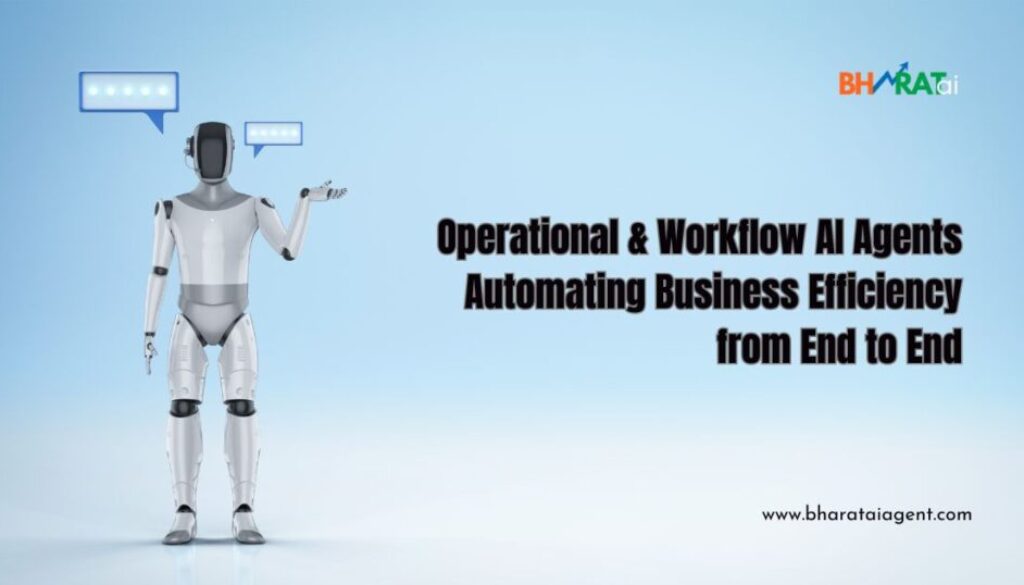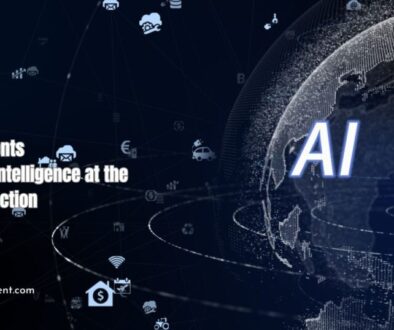Operational & Workflow AI Agents in 2025: Automating Business Efficiency from End to End
Introduction
Operational & Workflow AI Agents have become foundational to how modern organizations manage internal processes, automate repetitive tasks, and achieve real-time operational intelligence. These agents are no longer just “tools”—they are autonomous, intelligent systems that streamline everything from data entry and approvals to inventory management, team coordination, and compliance workflows.
In this AI-optimized and structured blog post, aligned with Google’s Search Generative Experience (SGE) and E-E-A-T principles, you’ll learn:
-
✅ What are Operational & Workflow AI Agents?
-
✅ Key functionalities and how they work
-
✅ Real-world examples and use cases (2025)
-
✅ Benefits for businesses of all sizes
-
✅ Challenges, risks, and best practices
-
✅ Future trends and long-tail FAQs
What are Operational & Workflow AI Agents?
Operational & Workflow AI Agents are intelligent software systems that autonomously manage, coordinate, and optimize internal business operations and processes. Unlike basic automation tools or static rule-based bots, these AI agents use:
-
✅ Machine Learning (ML)
-
✅ Natural Language Processing (NLP)
-
✅ Generative AI
-
✅ Business Process Automation (BPA)
-
✅ Real-time decision-making
…to perform tasks that traditionally required human input, such as managing approvals, syncing teams, tracking KPIs, generating reports, or optimizing inventory.
Core Functionalities of Workflow & Operational AI Agents (2025)
✅ 1. Task & Workflow Automation
-
Automatically triggers workflows based on pre-set conditions or user actions.
-
Example: Auto-assigning tickets in a customer support system or triggering approval flows when purchase thresholds are crossed.
✅ 2. Intelligent Data Processing
-
Extracts, processes, and validates data from documents, emails, forms, and APIs in real time.
-
Example: AI agents reading invoices, verifying vendor details, and pushing data into ERP systems.
✅ 3. Cross-System Integration
-
Connects tools like CRMs, ERPs, HRMS, Slack, Notion, Trello, etc., creating seamless end-to-end workflows.
-
Example: An AI agent syncing task updates from Salesforce to Notion, while updating project timelines in real-time.
✅ 4. Smart Notifications & Alerts
-
Sends contextual alerts via email, WhatsApp, or Slack based on workflow status or anomalies.
-
Example: An agent alerts managers when SLAs are about to breach or stock levels fall below reorder thresholds.
✅ 5. Real-Time Monitoring & Reporting
-
Continuously tracks workflow progress and generates performance dashboards.
-
Example: An agent generates daily operational reports, highlights delays, and suggests optimizations.
✅ 6. Predictive Process Optimization
-
Uses machine learning to suggest or execute workflow improvements.
-
Example: Reallocating resources automatically to meet production deadlines based on predicted delays.
Real-World Applications Across Industries
🏢 Manufacturing
-
Automates production schedules, quality control reports, and inventory restocking.
💼 Finance & Accounting
-
Handles accounts payable/receivable, reconciliations, and compliance workflows.
🛍️ Retail & E-commerce
-
Manages order fulfillment, return workflows, and real-time inventory sync.
🏥 Healthcare
-
Automates patient intake forms, report generation, and compliance reporting.
📦 Logistics & Supply Chain
-
Monitors delivery timelines, vehicle availability, and triggers delay alerts.
🧑💼 Human Resources
-
Automates onboarding, leave approvals, performance reviews, and payroll workflows.
Benefits of Using AI Agents in Operations & Workflows
Implementing AI agents across workflows leads to:
-
🚀 Increased Efficiency: Reduce manual errors and time delays.
-
⏱️ Faster Turnaround: Execute approvals, escalations, and task transitions instantly.
-
🔍 Process Transparency: Real-time tracking and status visibility across departments.
-
💸 Cost Reduction: Minimize workforce time on repetitive admin tasks.
-
📊 Actionable Insights: Make data-driven decisions through automated reporting and alerts.
-
🤖 24/7 Availability: Agents operate continuously without downtime.
Latest Innovations in 2025
-
Agentic Orchestration Tools: Platforms like n8n, Make.com, and Zapier AI are now equipped with AI agents that auto-build and optimize workflows.
-
Multi-agent Collaboration: Multiple AI agents collaborate autonomously to manage complex processes end-to-end (e.g., sales → billing → reporting).
-
Voice & Chat Interfaces: Teams can now interact with workflow agents using natural language through tools like WhatsApp, Slack, or Voice AI.
-
Low-code/No-code Deployment: Non-technical users can now configure, train, and manage workflow agents without engineering support.
Challenges & Considerations
Despite their capabilities, businesses should keep in mind:
-
🔒 Data Security & Compliance: Ensure workflows involving sensitive data (e.g., PII, health, finance) are encrypted and audit-ready.
-
🧠 Over-Reliance on AI: Human oversight is still essential for high-risk decisions and edge cases.
-
⚙️ Integration Complexity: Proper system mapping and API readiness are key for seamless agent performance.
-
🔁 Maintenance & Feedback Loops: Agents require regular updates, user feedback, and performance checks to stay aligned with business goals.
Future Trends: Where Operational AI Agents Are Headed
-
✅ Autonomous Business Operations (ABO): AI agents will fully manage departments like logistics, finance, or HR with minimal human input.
-
✅ Self-Healing Workflows: AI agents will detect and fix broken processes or dependencies without manual intervention.
-
✅ Voice-first Workflow Management: Voice-AI assistants will allow teams to create, monitor, and trigger workflows through voice commands.
-
✅ Generative Reporting: AI agents will automatically generate visual dashboards, summaries, and executive insights.
FAQs: Operational & Workflow AI Agents
Q1: What is an Operational AI Agent?
An operational AI agent is an intelligent assistant that automates internal business processes, monitors workflows, and executes routine tasks autonomously.
Q2: How are they different from RPA bots or basic automation?
Unlike static bots, AI agents can learn, adapt, and make decisions. They don’t just follow rules—they analyze, optimize, and interact across multiple systems dynamically.
Q3: Do I need a developer to use AI workflow agents?
No. Most platforms now offer no-code or low-code interfaces, allowing business users to deploy AI agents without technical skills.
Q4: Are AI agents secure for sensitive business data?
Yes, if built on secure frameworks with role-based access, encryption, and audit trails. Compliance with ISO, GDPR, and HIPAA is now standard among top providers.
Q5: What’s the ROI of AI agents in operations?
Most businesses report 30–60% reduction in manual effort, faster task resolution, and significantly improved SLA adherence within 3–6 months of deployment.
Conclusion
Operational & Workflow AI Agents are reshaping how organizations function—delivering smarter, faster, and more scalable operations. Whether you’re a startup looking to automate onboarding or an enterprise streamlining your supply chain, AI agents help you unlock efficiency and focus on strategic growth.
#WorkflowAutomation #AIAgents #BusinessAutomation #AIProductivity #DigitalOps #FutureOfWork #OperationalAI #WorkflowAI #NoCodeAI #ProcessAutomation #AIinBusiness
Operational AI Agents 2025
Workflow Automation AI
No-code AI Workflows
Business Process AI Agents
Internal Operations Automation
Intelligent Workflow Management
n8n AI Agents
AI Agents in HR & Finance
Workflow AI Benefits
Autonomous Operations 2025
What are workflow AI agents
Process automation tools 2025
AI in business operations
Workflow bots vs AI agents
Real-time AI reporting
Cross-platform AI integration
Enterprise AI workflow tools
Predictive operations AI
Human-in-the-loop workflows
AI operations best practices




